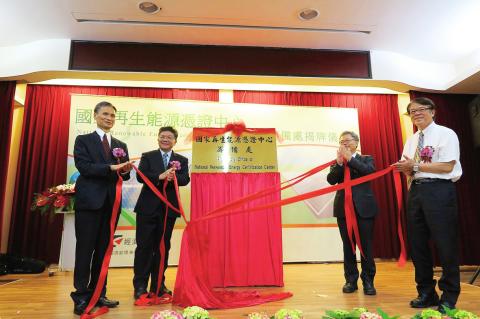The Ministry of Economic Affairs yesterday established the National Renewable Energy Certificate center as part of efforts to attract foreign enterprises that pledge to use “renewable” energy when investing or placing orders with local manufacturers.
“Google and some foreign companies used to raise doubts over the ‘purity’ of the renewable energy supply here. Certificates issued by the center could ease such concerns,” Minister of Economic Affairs Lee Chih-kung (李世光) said, adding that both Google and Apple Inc have welcomed the center.
The Taipei-based center is to issue its first renewable energy certificate (REC) before the end of June at the earliest, according to the Bureau of Standards, Metrology and Inspection.

Photo courtesy of the Ministry of Economic Affairs
‘GREEN’ TAGS
RECs, also known as “green” tags, provide proof that an enterprise’s electricity was generated from an eligible renewable energy source. The US, EU, Japan and Australia also have institutions to issue RECs.
Certifiable renewable energy sources include solar, wind, biomass, hydroelectric and geothermal power, bureau Director-General Liu Ming-chung (劉明忠) said.
The center will verify the power generation process and investigate a company’s actual “green” power usage, Liu said.
In addition, the center could serve as a matchmaking platform to help enterprises seek power companies to buy “green” energy and obtain RECs.
CLOSELY MONITORED
Some international companies, such as Google, have closely monitored the ministry’s process to establish the center as they have investments in Taiwan, a source at the bureau told the Taipei Times on condition of anonymity.
The source said that after Apple on Thursday released its environmental report saying that three more of its suppliers have pledged to power their production lines only with renewable energy sources by the end of next year, the bureau received “countless” calls from local firms in the Apple supply chain asking about the process of applying for RECs.
The bureau is to host a conference for enterprises and power companies on Friday next week to explain the REC application process in detail, the source said.

Intel Corp chief executive officer Lip-Bu Tan (陳立武) is expected to meet with Taiwanese suppliers next month in conjunction with the opening of the Computex Taipei trade show, supply chain sources said on Monday. The visit, the first for Tan to Taiwan since assuming his new post last month, would be aimed at enhancing Intel’s ties with suppliers in Taiwan as he attempts to help turn around the struggling US chipmaker, the sources said. Tan is to hold a banquet to celebrate Intel’s 40-year presence in Taiwan before Computex opens on May 20 and invite dozens of Taiwanese suppliers to exchange views

Application-specific integrated circuit designer Faraday Technology Corp (智原) yesterday said that although revenue this quarter would decline 30 percent from last quarter, it retained its full-year forecast of revenue growth of 100 percent. The company attributed the quarterly drop to a slowdown in customers’ production of chips using Faraday’s advanced packaging technology. The company is still confident about its revenue growth this year, given its strong “design-win” — or the projects it won to help customers design their chips, Faraday president Steve Wang (王國雍) told an online earnings conference. “The design-win this year is better than we expected. We believe we will win

Chizuko Kimura has become the first female sushi chef in the world to win a Michelin star, fulfilling a promise she made to her dying husband to continue his legacy. The 54-year-old Japanese chef regained the Michelin star her late husband, Shunei Kimura, won three years ago for their Sushi Shunei restaurant in Paris. For Shunei Kimura, the star was a dream come true. However, the joy was short-lived. He died from cancer just three months later in June 2022. He was 65. The following year, the restaurant in the heart of Montmartre lost its star rating. Chizuko Kimura insisted that the new star is still down

While China’s leaders use their economic and political might to fight US President Donald Trump’s trade war “to the end,” its army of social media soldiers are embarking on a more humorous campaign online. Trump’s tariff blitz has seen Washington and Beijing impose eye-watering duties on imports from the other, fanning a standoff between the economic superpowers that has sparked global recession fears and sent markets into a tailspin. Trump says his policy is a response to years of being “ripped off” by other countries and aims to bring manufacturing to the US, forcing companies to employ US workers. However, China’s online warriors